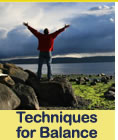    
Balancing Act: The Newsletter (No. 122: October 2009) Follow me on Twitter! You can find me here: New consulting and leadership tips posted daily! And find me on Facebook: 

I have a great deal of fun provoking people. Whether on my public blog (contrarianconsulting.com), my private chat room (AlansForums.com), or in a conversation at a social event my wife has dragged me to. I like good debate, because it sharpens the mind (and tends to drive away people at fund raisers). In so doing, I notice something of no small import: Some people become intractable, insensitive, and virtually insane defending their perceived turf. As tendentious as a traditional colporteur, they defend to the death some kind of conceptual terrain. As an example, whilst I dabble on the �social platforms,� I comment that they have limited utility for many professional endeavors, but they do offer some promise for certain specific areas. If I laud one over the others, in a Brooklyn minute someone is arguing for his or her �turf,� calling names, vehement in their resistance, and often obscene and nasty. It�s as if they invented linkedin, or share DNA with Facebook, or have an advanced degree in Twitter (PhTwit?). The real point is to be able to debate and argue and refine processes. Who should lead strategic initiatives? What�s the dynamic required for parents and teachers to best collaborate to help the child? Why do some teams with similar talent outperform others? Does an underdog win because they�ve been identified as an underdog early? I tell people in my Mentor Program, early on, that the good thing about me is that you can always ignore me. I don�t mind. I have no abacus that keeps track of �converts.� All I can do is put my arguments and reasoning out there and let others decide. And that�s all I ask of others. Allow me to listen, read, and then accept or reject your premise without your feeling personally aggrieved or insulted. Life provokes you every day. Little things. Life. Birth. Death. Infinity. Love. You have to be passionate about the very uncertainty. Because if you�re certain of too many things, then I�m sure of just one thing: You�re never going to learn. 
Please read before disregarding I ran a teleconference recently, the largest I�ve ever run, and my practice is to send instructions twice, once about a week prior, and once about a day prior. I find people easily lose things, aren�t disciplined about their email, have spam filters so paranoid that you need to jump through nine hoops to get through (which I won�t do), and have mailboxes which are full and won�t accept more mail. On top of that, people who DO receive the information ignore it! I stipulated that the conference included a free recording to access and a free download to follow within 48 hours. Yet three dozen people wrote to ask if it was recorded and how to get a download. (My favorite was the person who requested the download BEFORE the original session! Where is the Great Kreskin when you need him?!) These are human foibles, and I�ve committed my share (see the ongoing column that concludes each Balancing Act, below). But they are also indicative of a larger issue for many people, which is not being �in the moment.� The computer has lulled people into thinking they can multi-task on a random basis, and we simply cannot. If you don�t believe that, I�ll bet you dollars to donuts that the next driver you see wandering into another lane, or driving in the left lane at 45 MPH in a 60 MPH zone, is either on the phone, texting, or putting on makeup. I watch people in meetings and classes trying to �fake it� by surreptitiously fiddling with their PDA while occasionally looking up. But ask them a question and they don�t know what you�re talking about. Most men shaving while also in a strenuous conversation will wind up cutting themselves, even with an electric razor. The clerk or waiter answering a colleague who is also waiting on me usually gets my request wrong. I can read and watch a football game, because I read between plays. But I can�t read and catch all the action if I don�t look up, and I can�t comprehend everything I read if I�m always trying to watch the screen. I can drive and talk hands-free, but I almost always pull over to dial a call because at high speed (or even low speed) I just can�t do both things well. It�s the old pat your head and rub your tummy routine. We weren�t good at it as kids, and we�re not any better as adults. (Have you ever watched someone in an expensive outfit try to talk while chewing food? Believe me, the outfit doesn�t help.) I don�t owe you all my time, but the time I promise to you ought to be yours alone. 
I�m in Boston�s Logan Airport, heading for Atlanta to make a speech. Even in first class I know they�ll have a small or mediocre food offering, and I�m starving. So I buy some trail mix with a newspaper and arrive at the gate about 15 minutes before boarding. I settle in with my reading and snack. However, the gate agent calls boarding earlier than usual, so I pack up my gear quickly and hit the door running to board early, so that I can stow my bag where I wish and nab a vodka tonic before takeoff. As I camp out in the window seat, I find that I stashed the newspaper under my arm and it�s still there, so I continue my reading. I realize, vaguely, that I�ve left the trail mix somewhere. After my Atlanta speech, I have a mad dash to make the flight I want back to Boston. The limo is waiting with the motor running, but we hit a couple of traffic jams. I race through the airport to security, and at the podium whip out my passport to hand to the security guy. He opens it and a handful of sunflower seeds and raisons roll down the slope onto his paperwork. He, I, and two people behind me silently watch the slow motion avalanche of gerbil food encroach on TSA territory. Finally, all is still. Gesturing to my briefcase, he asks, �Are you carrying any rodents in there?� 
|

Balancing Act® is our registered trademark. You are encouraged to share the contents with others with appropriate attribution. Please use the ® whenever the phrase "Balancing Act" is used in connection with this newsletter or our workshops. Speaking with AlanAt Alan's home
|
| Having problems viewing this email, click
here. |
|
P.O. Box 1009 � East Greenwich, RI 02818-0964 � Telephone: (401) 884-2778 � Fax: (401) 884-5068
All Rights Reserved. Copyright 2009 Summit Consulting Group








